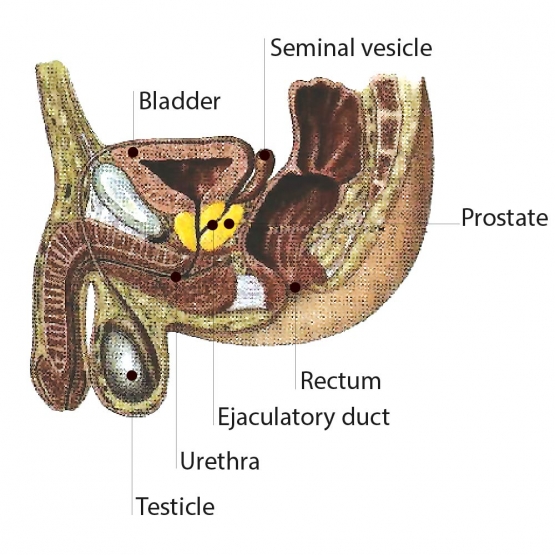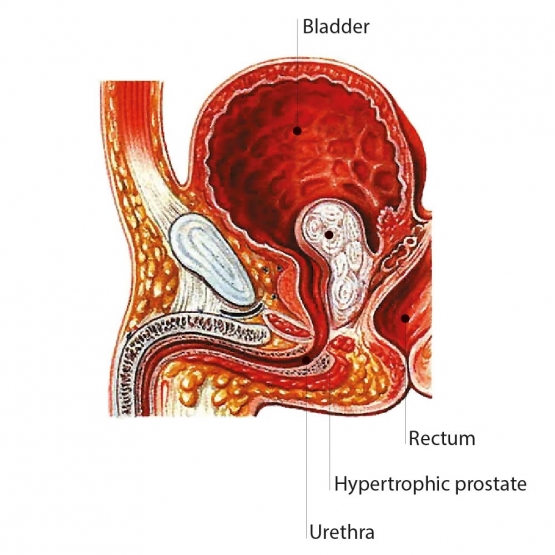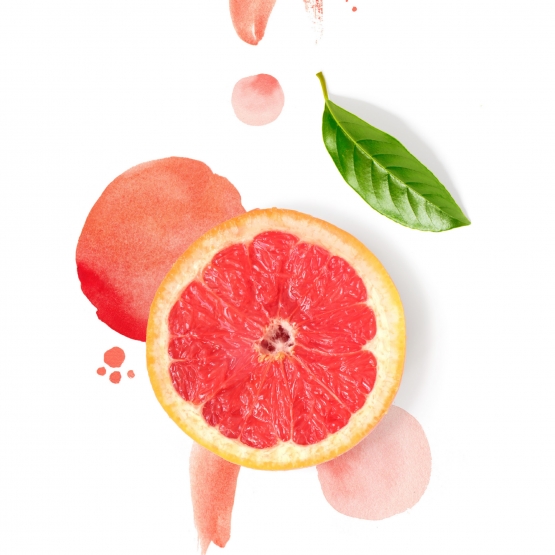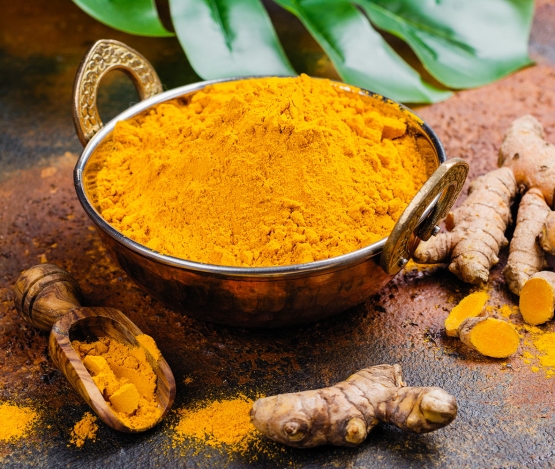Ours is a holistic approach that does not hinder the physiological processes of the body. It's an approach that encourages the restoration of balance, by combatting the causes of symptoms as efficiently as possible and ensuring fast relief.
Symptoms and relief
SELECT YOUR NEED

Male sexual sphere
The prostate
The prostate gland produces seminal fluid, an essential vehicle for the spermatozoa, which reach it from the testes through the vas deferens. It is shaped like a small chestnut, with the tip pointing downward and the bladder resting on top. The urethra traverses it, and it is indispensable for ejaculation. Sperm passes through the urethra, the same duct through which urine flows, which is the reason why prostate problems interfere with the ability to urinate and have sexual intercourse.


THE MOST COMMON PROSTATE ISSUES
Prostatitis
An infection of the prostate is a much more frequent occurrence than one might think. It is caused either by pathogenic bacteria from outside, or by bacteria or parasites coming from one's own intestine (in individuals with constipation, colitis, candidiasis, etc.). The symptoms of prostatitis may include: increased urination frequency or a sense of weight in the perineal area (between the testicles and anus), general malaise which could present with a very high fever, an intense burning sensation during urination, difficulty urinating all the way to complete blockage. Other symptoms that may be encountered, in various combinations, are: urethral discharge, hemospermia, sexual deficiencies (loss of sexual potency, premature ejaculation) or a burning sensation during ejaculation, urgent urination, "discomfort" at the tip of the penis or in the groin area. Prostatitis is a disease which needs to be treated quickly in the acute phase, because if it chronicizes healing becomes more difficult, relapses are frequent and the consequences can be felt even years later, worsening the issues associated with benign prostatic hypertrophy.
Grapefruit Seed Extract (GSE)
Its extraordinary broad-spectrum antibacterial, antifungal and antiparasitic properties, now widely demonstrated by Laboratories, Institutes and Universities all over the world, make it a particularly active and effective element against the microorganisms responsible for prostatitis and frequent urinary infections as a result of benign prostatic hypertrophy. Its efficacy can be considered decisive due to its ability to be "selective" in its antimicrobial action; GSE is effective against pathogens while not affecting the physiological bacterial flora.

Serenoa serrulata
The most important chemical constituents are different sterols (including betasitosterol*), free fatty acids, carotenoids, essential oils, and polysaccharides. The efficacy of Serenoa serrulata comes from its synergy of different mechanisms of action:
- Inhibition of 5-alpha-reductase, an enzyme involved in the transformation of testosterone into dihydrotestosterone, a biologically active metabolite capable of stimulating cell proliferation, thereby promoting hypertrophy of prostate tissue;
- Selective local antagonism of dihydrotestosterone/androgen receptor binding;
- Antiestrogenic effect, given by a strong decrease in receptors for estrogen, which appears to potentiate hormonal action in the development of prostatic hypertrophy;
- Anti-inflammatory and antiedemigenous action, demonstrated by histamine-induced reduced capillary permeability, resulting in reduced cervicoprostatic obstruction.
Maca (Lepidium meyenii)
Of particular relevance is the content of amino acids and essential fatty acids, as well as vitamins (B1, B2, B12, C, D, E) and minerals (calcium, iron, phosphorus, copper, potassium, magnesium, zinc). The Maca root extract contained in the product has two main indications: aphrodisiac action and treatment of impotence. Maca root has such a high content in p-metoxybenzyl isothiocyanate, an aphrodisiac substance, that it is unique in nature.
Clinical studies conducted by numerous American physicians have shown that taking Maca has positive effects on male sex life by increasing libido and improving sexual performance. It has also been shown to be extremely effective in the treatment of erectile dysfunction and impotence, whether it manifests as a pathological state as a result of prostatitis or prostatic hypertrophy or whether it arises physiologically with advancing age. Improvement of urination and treatment of benign prostatic hypertrophy: due to the presence of vitamins and minerals (particularly zinc and copper), but especially the very high concentration of beta-sitosterol.
Urtica urens
The dry extract from its roots, used in the product, is titrated to 0.4% beta-sitosterol* . Scientific documentation shows that the root can reduce the volume of the prostate gland with benign hypertrophy by 70%, by inhibiting the growth of prostate cells.
Avena sativa
A plant rich in B vitamins, pantothenic acid, enzymes, minerals (calcium and phosphorus), various trace elements, an alkaloid (avenin), and salicylic acid; balances male hormones by increasing sexual desire and sexual capacity, has an anti-inflammatory effect on prostatic tissues, good diuretic activity, and, as some scientific experiments have shown, in combination with Serenoa serrulata, it helps reduce an enlarged prostate.
LIFESTYLE - NUTRITION - MALE SEXUAL SPHERE
The well-being of the male sexual sphere inevitably involves a varied and balanced diet, together with good management of stress and adequate physical activity. Unfortunately, the frantic pace of life nowadays is pushing more and more men into the "maelstrom" of psychophysical stress as well as eating without real knowledge of the impact daily choices have on health. The World Health Organization (WHO) guidelines also provide concrete guidance on what to do. The first step is to avoid the abuse of refined carbohydrates such as refined grains and their derivatives (white pasta, white rice, white bread, etc.); sugars and packaged foods that contain sugars; hydrogenated fats; cheeses; and red meat and processed foods that contain it as an ingredient. Few people know that excess consumption of the foods mentioned can worsen inflammation, weaken the immune system and, last but not least, have a negative effect on any treatment being undertaken, lengthening recovery time. After pointing out these disadvantageous habits, we will now turn our attention to the foods that are good for alleviating prostate discomfort. The focus is on foods that positively affect the nervous system, fostering calm and peacefulness in addition to their anti-inflammatory properties. A question may arise at this point is: how can one increase the "quantity" of inner peacefulness which is essential for proper sexual performance? The answer may be subjective, but all in all, there are concrete parameters one can rely on. The most relevant hormone is serotonin, also known as the "peacefulness hormone," generated by the body from a precursor found in foods: tryptophan (one of the essential amino acids that are not produced by the body). But take note: not all foods with a high level of tryptophan will automatically lead to more serotonin being produced. The presence of carbohydrates, iron and B vitamins is essential for serotonin to be synthesized, a process that is facilitated by the presence of antioxidants.
THE BENEFITS OF
- SPINACH, BEET, CABBAGE, BROCCOLI. They are a source of antioxidants with a positive impact on tryptophan metabolism
- OATS. It contains "good" carbohydrates, which facilitate the absorption of tryptophan
- WALNUTS AND ALMONDS. They are rich in tryptophan and magnesium. Magnesium, involved in multiple biochemical processes, is an essential mineral supplement for prostate problems
- TURMERIC. This is a spice with valuable antioxidant and anti-inflammatory properties that can be used in combination with grains and animal and vegetable proteins (fish, white meat, legumes)
- PUMPKIN SEEDS. The continued consumption of pumpkin seeds and oil has been noted to reduce the symptoms of prostatic hypertrophy. Studies and research have also confirmed the beneficial properties of pumpkin seeds for the prostate.

- choosing foods of organic and/or 0-km origin
- following a varied diet, favoring the consumption of fruits and vegetables, preferably in season, easily digestible proteins (fresh small fish, white meat, eggs), legumes, pumpkin seeds, sunflower, flax, chia, etc., walnuts, almonds, hazelnuts, etc.
- consuming cereals, preferably whole grain but not only, because in some cases fiber prevents the absorption of minerals and other nutrients, semi-wholegrain cereals and pseudocereals (quinoa, buckwheat, amaranth)
- preferring foods that are sources of omega-3 fatty acids, such as flax oil, hemp oil, oily fish (mackerel, sardines, sardines etc.), chia seeds, flax seeds, etc.
- staying adequately hydrated. Water requirements vary from individual to individual and change according to different lifestyles, the type of activity and the diet. An adult should generally drink 2 liters of water per day for maintaining their health. Water is an essential element for the body because it regulates various biological functions. Therefore, it is important to maintain proper hydration, especially during the summer season, during sports activities and in all situations where a lot of fluids are lost.
- avoiding abuse of gluten-containing foods, packaged foods and fried foods
- limiting sugar, sugary drinks, refined grains (white bread, white pasta, white rice, etc.)
- avoiding hydrogenated fats, limiting red meat, milk and its derivatives, and salt. When consuming them, prefer those of high quality
The notions and advice offered herein are for educational purposes only and cannot under any circumstances replace medical advice. For a complete diet, it is necessary to consult a nutritionist, who, after appropriate clinical and instrumental examination, will be able to identify the needs of the person concerned and put together a personalized diet plan.